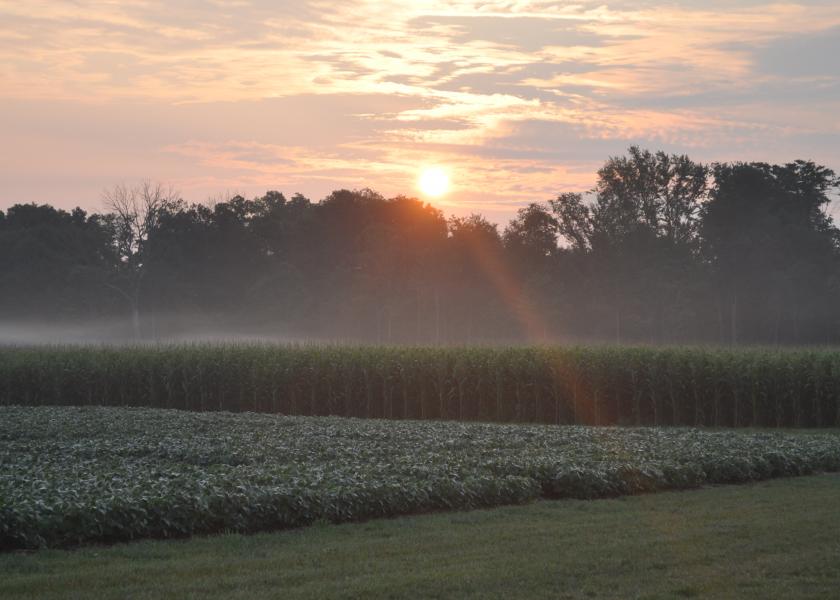Iowa Farmer Shares Thoughts On Outcome Based Pricing

Ben Riensche, owner and manager of Blue Diamond Farming Company dreads Monday morning white pickup syndrome.
He describes this phenomena as the steady parade of ag salespeople driving onto his farm after Monday morning meetings with their managers who told them they need to go visit farmers.
“There’s a lot of people involved in the sales process,” Riensche says. “Particularly in seed sales, it’s ripe for disruption.”
On December 10, Farm Foundation hosted a panel at the National Press Club in Washington DC, where Riensche was joined by Chad Bilby, North America commercial innovation experimentation lead, Bayer Crop Science and Joe Young, president and chief operating officer with Growers Edge Financial. The group discussed the development of outcome based pricing models.
At the time of the panel discussion, Riensche said he still had 11% of his crop out in the field, and that helps illustrate his biggest takeaway when thinking about outcome based pricing, weather trumps all.
“2019 was a big reminder that no matter how sophisticated a production system you have, weather drives it all,” he says. “If outcome based pricing is about managing the variability, it’s going to be a home run. I need help to manage the variability. But if the MBAs in the marketing office have nostalgia about prices from the commodity boom, and why prices aren’t at that level, it’ll fall flat on its face.“
Bayer is continuing its pilot program with outcome based pricing in 2020, with a main focus on seed as well as fungicides.
Drawing on experience from his corn and soybean farm in eastern Iowa, Riensche shared challenges, opportunities and the best fit as he sees it for outcome based pricing.
Riensche says his farm business has built on successes with technology adoption, including using Climate FieldView, the platform that helps drive the Bayer outcome based pricing models. But even with his experience in using technology to drive agronomic decisions and adopting new practices, he has questions on the details of how outcome based pricing will work.
“I make 99 decisions a year to raise a good corn crop. One of those things is pick the seed. How do we knife out the attributable results of the seed from insecticides, fungicides, drainage, etc?” he says. “Seed might be a top 20 decision, but I don’t know what improves my choice because of weather. Crop care products may be in the top half of the decisions I make, but there are so many substitutes how do I separate that out?”
His skepticism also extends to the data quality being used for the computer models.
“Combine data technology has a ways to go. If you have three combines in a field, even with wonderful technology, it’s hard enough to make them say the same time versus measure the same yield,” he says. “Mass flow sensors are a good proxy, but only in the last year or two have combine manufacturers come out with scale technology. And I can’t afford a new combine right now.”
He shares an example of two combines, both calibrated in the morning and harvesting the same field with corn planted on the same day, and one showed 285 bu. and one showed 215 bu.
“Outcome based pricing could be a great tool. And I’ll certainly give it a try. In the future, I believe I’ll be buying crop inputs from a company with the know-how and on a sliding scale,” he says. “Good farmers are not coming into this flying blind. We have geo-spatial referencing, prescription application and independent consultants. This proposition is a trade-off. If I buy a basket of your exclusive products (instead of mixing and matching) you give me a sliding price scale.”
As Riensche sees it, the opportunity of outcome based pricing models do have a long term benefit.
“Maybe the mission is bigger. And that’s what I’d really like to have–transformative innovations. Get me out of monoculture—give me more choices than corn and soybeans.”
Riensche sees opportunities beyond being paid for yield such as carbon sequestration and identity preserved crops.
In addition to new business opportunities, he sees potential for outcome based pricing to drive some needed changes—and additional transparency.
“Paying for ag inputs is not a straight line. There are incentives for packages and programs, zero interest for pre-payment, and there are a lot of sticky linkages that have to be cleaned up,” Riensche says.
Outside of his Iowa farm, Riensche sees two areas where outcome based pricing could show its value.
“It’s certainly a good fit for young farmers and those in marginal production areas. It helps spread money you have over more acres, and it helps manage for high variability,” he says.
Going forward, Riensche will be keeping an eye on how this develops.
“We need mammoth leaps in technology. These models will have to get a lot more reliable,” he says. “Everyone is suspicious if the house will always win. But I don’t want to be accused of lying about my yields. And I don’t want to be audited by the input company. How will I sleep at night?”







